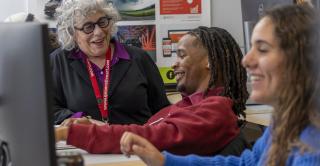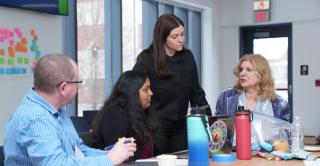
Central Connecticut State University President Zulma R. Toro delivered the annual State of the University Address on Sept. 18, during which she shared her year in review of successes and list of goals for the academic year and beyond.
Speaking to faculty and staff gathered in Alumni Hall, Toro described the past year as a time of “momentum and achievement,” lauding the university community for helping Central to thrive despite challenges in the higher education landscape nationwide. Toro credited teamwork and innovation and regular self-assessment as drivers of Central’s successes this year.
She explained, “We have continued to lean into three pillars at which we excel: facilitating access to higher education; providing high-quality, unique and engaging educational experiences; and supporting our students as they transition to the workforce, which, by extension, supports our neighboring communities.”
Toro’s presentation outlined current university operations and initiatives within multiple departments. Among several additional topics—including technology upgrades, infrastructure projects, and budget updates—Toro discussed enrollment; efforts to increase access to higher education; and experiential learning developments.
The address also included the presentation of Central’s highest honor, the Distinguished Service Award, to Associate Dean of Student Affairs Ramon Hernandez, who retired in the spring. Hernandez was recognized for his leadership in expanding opportunities, supporting student development, and cultivating a welcoming campus for more than 30 years.
Record enrollment and housing
Among many “good news” items, Toro announced that Central this fall welcomed the largest incoming class to date: 1,736 students, representing a 30.7 percent increase in first-time, full-time undergraduates over last year. Total enrollment rose by 12.7 percent, the highest since 2018.
“Our preliminary retention rate for first-time, full-time students who return the following fall semester is 75.6 percent,” Toro noted. “We still have work to do, but our goal of 81.5 percent is within reach.”
On-campus housing also broke records, with 2,585 students in residence halls this semester—an increase of 9.6 percent over last year’s record.
Expanding access and opportunity
Toro also spotlighted efforts to widen access to higher education through dual and concurrent enrollment, which grew from 15 to 28 participating school districts in just one year. Transfer pathways have also been strengthened through new advising positions; partnerships with Connecticut community colleges; and participation in Arizona State University’s Design Accelerator Institute.
In addition, Central is broadening academic pathways through new and innovative programs. Over the past year, faculty received approval for more than 15 new programs, including master’s degrees in Artificial Intelligence, Cybersecurity, and Student Development in Higher Education, as well as a Bachelor of Arts in Integrated Multimedia Production. New concentrations and minors include Digital Humanities, Human Resource Management, and Sports Studies.
The university has also expanded its Accelerate Central pathways in fields like Business, Computer Science, and Cybersecurity, allowing students to complete bachelor’s and master’s degrees in as little as five years.
Meanwhile, new partnerships through the Office of Professional Education and Graduate Studies offer adult learners micro-credential and apprenticeship programs that can expand their skillsets on the road to career advancement.
Experiential learning adds to the experience
Central’s commitment to experiential learning remains a hallmark of its academic programs. Toro said that expanded applied learning opportunities at Central will cultivate a mutually beneficial pipeline for students, the business community, and the university itself.
“Through paid internships, co-ops, service learning, community engagement, study abroad, undergraduate research, leadership development, and capstone projects addressing real partner needs, our students gain skills, confidence, and start to envision themselves as changemakers,” she said. “Our community partners receive well-prepared, career-ready individuals, and we, in turn, learn from students about workplace trends and the needs of today’s industries.”
The developing Central CT Workforce and Innovation Hub will play a key role in facilitating university goals for economic and community development support.
“This initiative is aimed at actively engaging students, faculty, and external partners through applied research, experiential learning, and professional education opportunities,” Toro said.
Toro outlined the new tools that will help students quantify and share their experiential learning experiences. The Central Pulse platform will allow faculty and staff to coordinate service learning and research projects and help students find opportunities and track their progress. Through the Central Pulse Comprehensive Learner Record, students will create a portfolio that features their leadership roles, on-campus jobs, study abroad, and experiential learning experiences to create a holistic profile of their growth and progress from start to finish.
Priorities and other goals
Looking ahead, the university is launching new initiatives, including the expansion of programs in health care and Artificial Intelligence; the new Central Childcare Lab School, which will build off the child-care center to include a preschool for 3- and 4-year-olds; and a forensic training facility in the Bichum Lab in collaboration with state agencies, among others.
Toro also envisions Central as a “globally engaged institution,” and has tasked her leadership team with boosting and expanding the university’s study abroad and international recruitment efforts. Several new projects are underway, including reorganization of how international, exchange, and study abroad students receive support on campus.
“Significant work has gone into reimagining the Center for International Education,” she explained. “Further progress includes the creation of an International Lounge, finalization of additional employment opportunities for international students on campus, and the expansion of programming to keep students engaged and facilitate relationship-building with faculty and staff.”
Toro closed the presentation with a call for continued collaboration and innovation, drawing on her full confidence in the university community.
“The accomplishments presented to you today were possible because of a dedicated and committed team; faculty, staff, students, and administration,” she said. “The work is ongoing. The challenges are real. But the potential—of Central, and of our students—is limitless.”



